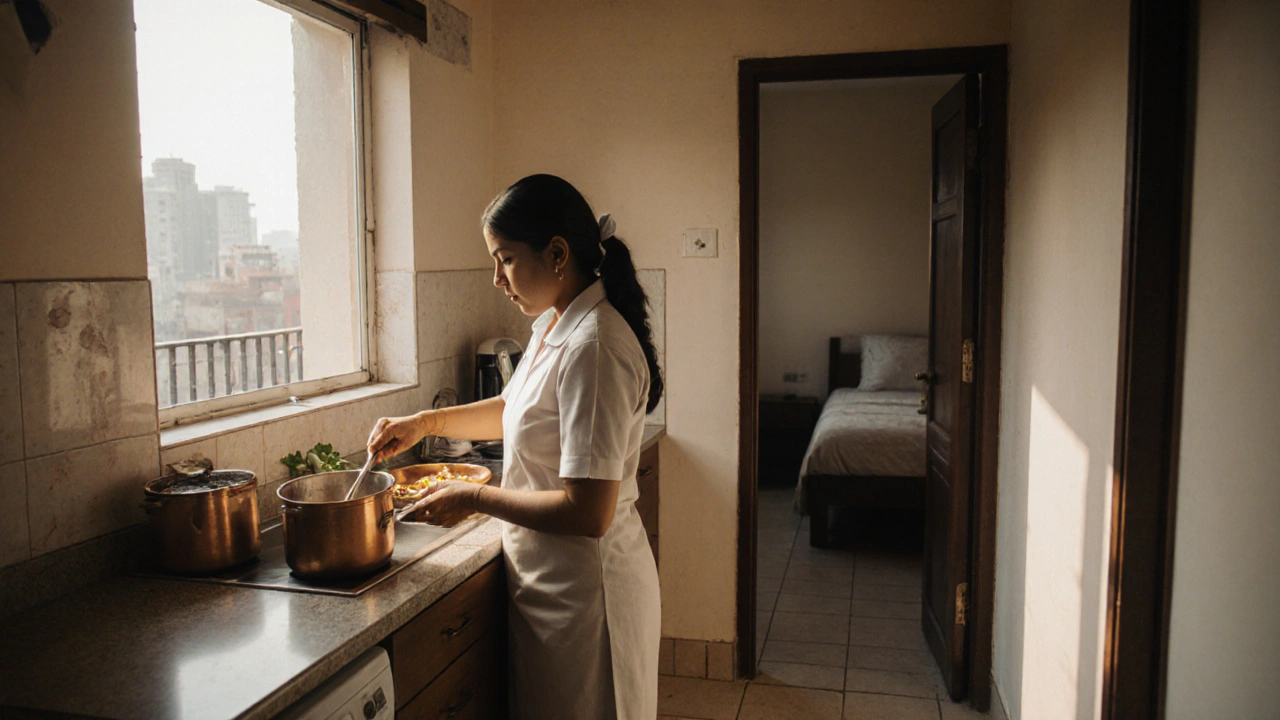24‑Hour Maid Salary in Mumbai 2025: How Much to Pay?
 Oct, 9 2025
Oct, 9 2025
24-Hour Maid Salary Calculator for Mumbai 2025
Calculate Your Maid's Total Cost
Get a precise estimate of the monthly salary and total costs for hiring a 24-hour maid in Mumbai based on your specific needs.
Your Maid's Estimated Costs
Base Salary
₹ 19,000
Minimum wage (₹12,000) + experience premium
Food & Accommodation
₹ 4,000
Monthly allowance for food and room
Agency Fee (if applicable)
₹ 2,500
One-time placement fee (10-15% of first month salary)
Statutory Contributions
₹ 2,500
ESI (1.75%) and PF (12%) on base salary
Total Monthly Cost
₹ 28,000
This includes all base salary, allowances, and statutory costs
When you start looking for a 24‑hour maid servant is a full‑day domestic helper who lives in the employer’s house and handles cleaning, cooking, laundry and basic childcare in Mumbai, the first question on everyone’s mind is the price tag. In 2025 the city’s cost of living has risen, but the domestic‑work market has also become more transparent. Below you’ll find the exact numbers you need, the factors that push the price up or down, and a step‑by‑step guide to hiring without surprises.
Key Takeaways
- Average monthly pay for a 24‑hour maid in Mumbai ranges from₹19,000to₹28,000.
- Location, experience, and agency fees can swing the cost by ±30%.
- Legal minimum wage for domestic workers in Mumbai (2025) is ₹12,000 per month; most employers pay 60‑130% above that.
- Hidden expenses-food, accommodation, overtime, statutory contributions-add roughly ₹5,000‑₹8,000 per month.
- Using a reputable maid agencya registered service that screens, trains and provides contract support for domestic workers reduces turnover risk and legal headaches.
What Exactly Does a 24‑Hour Maid Do?
A 24‑hour maid lives in your home, usually sleeps in a designated staff room. Their daily routine includes:
- Deep cleaning of floors, bathrooms and kitchen.
- Washing, drying and ironing clothes.
- Preparing simple meals (often breakfast and dinner).
- Occasional childcare or pet‑care, depending on the agreement.
- Running basic errands such as grocery shopping.
This arrangement differs from a part‑time cleaner who comes a few hours a week. Because the maid is on‑site 24/7, you’re also covering basic living costs-food, a modest allowance, and sometimes a small stipend for personal use.
How Wages Are Calculated in Mumbai
The baseline is the minimum wage for domestic workers₹12,000 per month as set by the Maharashtra State Government for 2025. From there, employers add a premium based on four main factors:
- Experience level: Fresh‑out‑of‑training staff earn close to the minimum; those with 5‑10years of experience command ₹20,000‑₹25,000.
- Location: Central Mumbai (e.g., Bandra, Juhu) sees rates 20‑30% higher than suburbs like Virar or Mira Road.
- Agency vs. direct hire: Agencies charge a placement fee (usually 10‑15% of the first month’s salary) and may recommend a slightly higher wage to ensure employee satisfaction.
- Additional responsibilities: If the maid also handles cooking for a large family or looks after young children, expect a 10‑20% bump.
Don’t forget statutory contributions. Employers must contribute to the Employees' State Insurance (ESI)a government social security scheme covering health and maternity benefits and the Provident Fund (PF)a retirement savings plan for permanent domestic staff earning over ₹15,000. Those contributions add roughly 1.75% (ESI) and 12% (PF) of the basic salary to the total cost.

Typical Cost Range in 2025
| Category | Base Salary (₹) | Food & Accommodation Allowance (₹) | Agency Fee (One‑time, ₹) | Statutory Contributions (₹) | Total First‑Month Cost (₹) |
|---|---|---|---|---|---|
| Low‑end (suburb, entry‑level maid) | 19,000 | 4,000 | 2,500 | 2,500 | 28,000 |
| Mid‑range (central Mumbai, 3‑5years experience) | 23,500 | 5,500 | 3,500 | 3,300 | 35,800 |
| High‑end (elite agency, 7+years, additional cooking duties) | 28,000 | 6,500 | 4,200 | 4,200 | 43,000 |
These numbers include the most common hidden costs. If you negotiate a “room‑only” arrangement (no food) the allowance drops to about ₹3,000, but you’ll need to provide a kitchen stipend elsewhere.
Where to Find Reliable Help
Three channels dominate the Mumbai market:
- Registered maid agencies: Companies like Delhi Home Care Services (operating in Mumbai) run background checks, offer insurance and handle contract paperwork. They charge 10‑15% of the first month’s salary.
- Online platforms: Websites such as UrbanClap and Helper Helper let you view profiles, read reviews and book interviews at no upfront fee.
- Word‑of‑mouth referrals: Neighbours and community groups (e.g., local “Mahila Samiti”) often recommend trustworthy workers who have already proved themselves.
For first‑time employers, agencies tend to be the safest bet because they shoulder part of the legal compliance burden.
Hidden Expenses & Budget‑Saving Tips
Even after you know the headline salary, a few extra line items can surprise you:
- Food allowance: If you feed the maid, budget ₹4,000‑₹6,000 per month for simple meals.
- Travel reimbursement: Some maids live in nearby suburbs and commute daily; a modest ₹500‑₹1,000 covers their train or bus fare.
- Overtime: Anything beyond the standard 10‑hour shift requires a 1.5× overtime rate under the Maharashtra Domestic Workers Act.
- Medical insurance: Not mandatory, but a basic ₹1,000‑₹1,500 per month plan saves headaches later.
To keep costs lean, consider:
- Providing a shared kitchen space instead of a full‑time cook‑for‑maiden.
- Negotiating a fixed food allowance rather than a variable month‑to‑month amount.
- Choosing a maid who already lives in a nearby area, reducing travel reimbursement.
- Bundling the statutory contributions into the base salary so the total number stays predictable.

Negotiating & Signing a Contract
A written contract protects both parties. Include these clauses:
- Job description: List daily duties, days off (usually one full day per week), and any extra tasks.
- Salary breakdown: Base pay, food allowance, overtime rate, and statutory contribution responsibilities.
- Notice period: Commonly 30days for either side; shorter periods require a penalty fee.
- Termination conditions: Grounds for immediate dismissal (e.g., theft, violence) and the process for final settlement.
- Accommodation details: Size of the staff room, privacy expectations, and any house‑rules.
Both you and the maid should sign two copies-one for each party. Keep the contract in a safe folder; it’s useful if a dispute ever reaches the labor court.
Quick Checklist Before You Hire
- Determine the exact duties and extra responsibilities.
- Set a realistic budget (salary+allowances+statutory costs).
- Choose a sourcing channel (agency, online platform, referral).
- Verify identity documents (Aadhaar, PAN) and prior employment letters.
- Ask for a trial week to gauge compatibility.
- Prepare a written contract covering all the points above.
- Register the employee with the ESI portal and, if applicable, the PF scheme.
Following this list saves time, money, and potential legal hassle.
Frequently Asked Questions
What is the legal minimum wage for a 24‑hour maid in Mumbai?
As of 2025, the Maharashtra government sets the minimum wage for domestic workers at ₹12,000 per month. Most employers pay above this floor to attract experienced staff.
Do I need to pay Provident Fund for a live‑in maid?
Yes, if the maid’s basic salary exceeds ₹15,000 per month and she works for more than 30days in a year. The employer contributes 12% of the basic pay to the PF scheme.
How much does an agency typically charge?
Most reputable agencies charge a placement fee equal to 10‑15% of the first month’s salary. Some also request a refundable security deposit, which you get back if the maid stays beyond six months.
Can I ask the maid to work overtime?
Overtime is legal but must be paid at 1.5 times the regular hourly rate. It should be clearly mentioned in the contract, and the maid’s consent is required.
Is it necessary to provide food for a live‑in maid?
Providing three simple meals per day is the industry norm and helps you stay within the typical salary band. If you opt not to feed her, you should increase the cash allowance by roughly ₹4,000‑₹6,000.

Patrick Tiernan
October 9, 2025 AT 13:53Wow, hiring a live‑in maid in Mumbai is basically a tiny mortgage.
Patrick Bass
October 9, 2025 AT 19:26The article lays out the cost components clearly; just double‑check the ESI and PF percentages for your exact salary band.
Colby Havard
October 10, 2025 AT 02:23One must first acknowledge that the domestic labour market in Mumbai is not merely a collection of numbers, but a reflection of broader socioeconomic stratifications; the minimum wage of ₹12,000, while legally mandated, serves as a baseline that scarcely addresses the lived realities of workers. Moreover, the premium added for experience-ranging from ₹19,000 for entry‑level to ₹28,000 for seasoned staff-mirrors the societal valuation of skill, yet it also perpetuates a wage hierarchy that can be exploitative. Central Mumbai’s 20‑30% surcharge, justified by cost‑of‑living arguments, implicitly endorses spatial inequality; a maid from Bandra is deemed more valuable simply because of her geographic origin. The agency fees, typically 10‑15% of the first month’s salary, add another layer of financial burden on the employer, while simultaneously generating profit for intermediaries who often lack transparency. Statutory contributions, such as ESI at 1.75% and PF at 12%, though ostensibly protective, become an administrative labyrinth for small households that may inadvertently fall out of compliance. Overtime, mandated at 1.5× the regular rate, is another hidden cost that can quickly inflate the monthly outlay if the maid’s duties exceed the standard ten‑hour shift. Food and accommodation allowances, ranging from ₹3,000 to ₹6,500, further complicate budgeting; the decision to provide meals versus cash allowance directly impacts the perceived dignity of the employment relationship. In addition, ancillary expenses-travel reimbursement, medical insurance, and occasional bonuses-though not always itemised, should be anticipated in any comprehensive financial plan. The recommendation to register the employee with ESI and PF portals is prudent, yet it underscores the administrative overhead that accompanies formal employment. Ultimately, while the presented tables offer a useful snapshot, they cannot encapsulate the nuanced negotiations that occur between employer and employee, nor the evolving legal framework that governs domestic work in Maharashtra. Prospective employers ought to approach this process with both fiscal diligence and ethical consideration, ensuring that remuneration is fair, legal obligations are met, and the human dignity of the domestic worker is upheld.
Amy P
October 10, 2025 AT 07:23Reading that dense exposition feels like watching a courtroom drama where every clause is a new plot twist-suddenly the maid’s salary morphs into a commentary on class, geography, and bureaucracy! It’s fascinating how a seemingly simple number can open a Pandora’s box of social critique.
Ashley Kuehnel
October 10, 2025 AT 11:33Hey there! Just wanted to add a quick practical tip: many agencies will let you split the fee into two instalments if you’re on a tight budget-just ask for a written agreement so there’s no surprise later.
Also, don’t forget to check if the maid already has a bank account; it makes the PF contributions a lot smoother. Sorry for the tyops, hope it helps!
adam smith
October 10, 2025 AT 17:40The numbers look fair, but I’d still compare a few agencies before signing anything.
Mongezi Mkhwanazi
October 11, 2025 AT 01:43Indeed, whilst the surface‑level figures appear reasonable, one must deliberate upon the latent ramifications inherent in delegating household stewardship to a third‑party entity; the agency’s vetting procedure, albeit ostensibly rigorous, may conceal systemic biases that perpetuate socioeconomic disparities, thereby engendering a subtle form of exploitation that is often obfuscated by the veneer of professionalism. Moreover, the contractual stipulations embedded within such engagements frequently incorporate clauses of ambiguous tenure, wherein the employer’s discretionary power to terminate employment is disproportionately weighted, leaving the domestic worker vulnerable to capricious dismissal without commensurate recourse. Consequently, a prudent employer should not merely acquiesce to the presented fee structure but instead meticulously scrutinise the contractual language, ascertain the precise scope of liability, and, where feasible, negotiate terms that safeguard both parties’ interests, thereby fostering an equitable and sustainable domestic arrangement.
Mark Nitka
October 11, 2025 AT 05:36Look, if you’re budgeting, just add the agency fee and the statutory contributions to the base salary and you’ll have a clear picture.
Kelley Nelson
October 11, 2025 AT 10:03While the pragmatic approach is appreciated, one must also consider the ethical dimension of compensating domestic labour at a rate that reflects both the intrinsic value of the work and the prevailing market standards; a nuanced appraisal ensures that the remuneration is not merely a transactional figure but a testament to the employer’s respect for the worker’s dignity.
Aryan Gupta
October 11, 2025 AT 14:46Everyone seems to ignore the fact that many agencies are actually fronts for larger syndicates that control the supply chain of domestic workers; it's a hidden power structure you should be wary of.
Fredda Freyer
October 11, 2025 AT 19:46That’s an intriguing point. Philosophically, the commodification of household care raises questions about how we value care work in society; perhaps a modest increase in wages could serve as a small corrective, aligning remuneration more closely with the essential nature of the services provided.
Gareth Hobbs
October 12, 2025 AT 01:03Honestly, the whole maid‑hiring industry is a sham; it’s another way for the elite to outsource their responsibilities while keeping the working class in perpetual servitude-look at the numbers, it’s blatant exploitation!!
Antonio Hunter
October 12, 2025 AT 06:36Let’s take a step back and consider the broader context: employing domestic staff can, if managed responsibly, contribute to economic empowerment for families that rely on such income; however, this positive outcome is contingent upon transparent contracts, fair wages, and a genuine commitment to the worker’s well‑being, rather than simply treating the arrangement as a cost‑saving mechanism. By fostering open dialogue and ensuring that statutory benefits are not merely a bureaucratic hurdle but a lived reality for the employee, we can transform a transactional relationship into a mutually beneficial partnership that respects human dignity.